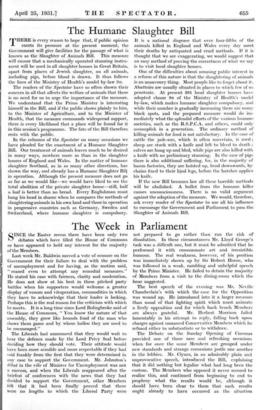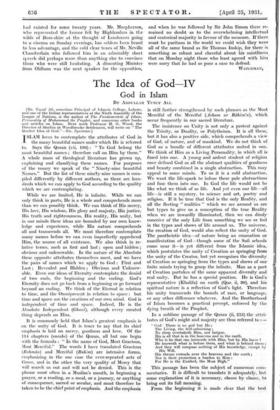The Week in Parliament S INCE the Easter recess there have
been only two debates which have filled the House of Commons or have appeared to hold any interest for the majority of the Members.
Last week Mr. Baldwin moved a vote of censure on the Government for their failure to deal with the problem of unemployment and for having, as the motion said, " ceased even to attempt any remedial measures." He stated his case with fairness, clarity and moderation. He does not show at his best in these pitched party battles when his supporters would welcome a greater display of venom and vituperation, commodities in which they have to acknowledge that their leader is lacking. Perhaps this is the real reason for the criticism with which he meets. It is a long time since Lord Bolingbroke said of the House of Commons, ." You know the nature of that assembly, they grow like hounds fond of the man who shows them game and by whose halloo they are used to be encouraged."
The Liberals had announced that they would wait to hear the defence made by the Lord Privy Seal before deciding how they should vote. Their attitude would have been more sensible and more respectable if they had said frankly from the first that they were determined in any case to support the Government. Mr. Johnston's debut in the role of Minister for Unemployment was not a success, and when the Liberals reappeared after the briefest of conferences with the news that they had decided to support the Government; other Members felt = that it had been finally proved that there were no lengths to which the Liberal Party were not prepared to go rather than run the risk of dissolution. In these circumstances Mr. Lloyd George's task was a difficult one, but it must be admitted that he performed it with consummate art and irresistible humour. The real weakness, however, of his position was immediately shown up by Sir Robert Home, who was followed in a weak, rambling and unhelpful speech by the Prime Minister. He failed to detain the majority of Members from a visit to the dining-room which the hour suggested.
The best speech of the evening was Mr. Neville Chamberlain's with which the case for the Opposition was wound up. He introduced into it a larger measure than usual of that fighting spirit which must animate a lively opposition and for which back bench Members are always grateful. Mr. Herbert Morrison failed lamentably in his attempt to reply, falling back upon charges against unnamed Conservative Members which he refused either to substantiate or to withdraw.
The Debate on the Sunday Opening of Cinemas provided one of those rare and refreshing occasions when for once the same Members are grouped under new standards and strange comanions jostle one another in the lobbies. Mr. Clynes, in an admirably plain and unprovoeative speech, introduced the Bill, explaining that it did nothing but legalize what had long been the custom. The Members who- opposed it never seemed to realize this, and continued from beginning to end to prophesy what the results would be, although it should have been clear to them that such results ought already to have occurred as the situation had existed for some twenty years. . Mr. Macpherson, who represented the horror felt by Highlanders in the wilds of Ross-shire .at the thought of Londoners going to a cinema on Sunday evenings, has seldom been heard to less advantage, and the cold clear tones of Mr. Neville Chamberlain who followed him in an admirably short speech did perhaps more than anything else to convince those who were still hesitating. A dissenting Minister from Oldham was the next speaker for the opposition, and when he was followed by Sir John Simon there re- mained no doubt as to the overwhelming intellectual and oratorical majority in favour of the measure. If there, must be puritans in the world we could wish they were all of the same brand as Sir Thomas Inskip, for there is something so robust and cheerful about his saintliness that on Monday night those who least agreed with him were sorry that he had so poor a case to defend.







































 Previous page
Previous page